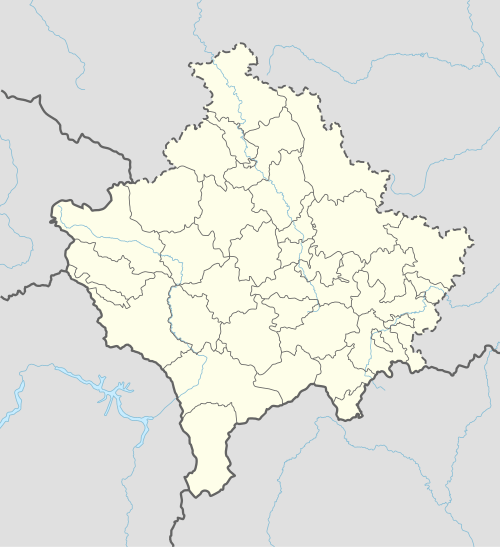Hajvalia
Hajvalia (Albanian: Hajvalia, Serbian Cyrillic: Ајвалија) is a village or suburb southeast of Pristina, located 635 meters above sea level. It lies in the municipality of Pristina. It has approximately 2,300 homes and 7 391 (2011) inhabitants. A small creek begins in the town, while another begins north-east of the town and runs through it. It is thought that the first 100 years of its history, just six Albanian families lived here. After 1970, right up until now, there has been an increase in population, mainly from newcomers.
Hajvalia | |
|---|---|
 Hajvalia Location in Kosovo | |
| Coordinates: 42°37′N 21°11′E | |
| Location | |
| District | Pristina |
| Municipality | Prishtinë |
| Population (2011) | |
| • Total | 7 391 |
| Time zone | UTC+1 (CET) |
| • Summer (DST) | UTC+2 (CEST) |
| Postal code | 10000 |
| Area code(s) | 0381 (0)38 |
The road here passes through Gnjilane and Pristina and connects with M25.2 way.
Demographics
| Year | 1948 | 1953 | 1961 | 1971 | 1981 | 1991 | 2011 |
|---|---|---|---|---|---|---|---|
| Population | 436 | 757 | 1192 | 1696 | 3027 | 3962 | 7391 |
Places of interest
There is a zinc and silver mine, which opened in 1953 and have been completely renovated, namely the Trepča Mines-Pristina (Hajvalia). A public park is located near the town-centre, along the Dëshmorët e Gollakut(Lit. Gollak Martyrs road). There is a mosque, Xhamia e Hajvalisë (Lit. Mosque of Hajvalia), in the south-west of the village.
Sport
The local football club was KF Hajvalia.
Education
There is only one primary school with roughly 2,500 pupils; Elementary School "Shkëndija" (Lit. "Spark").
Other
Behgjet Pacolli AKR chairman and former president of Kosovo is a resident. In Hajvalija there is the International Village. After the war it saw development of small businesses and private businesses.
Notes
- Kosovo is the subject of a territorial dispute between the Republic of Kosovo and the Republic of Serbia. The Republic of Kosovo unilaterally declared independence on 17 February 2008, but Serbia continues to claim it as part of its own sovereign territory. The two governments began to normalise relations in 2013, as part of the 2013 Brussels Agreement. Kosovo is currently recognized as an independent state by 97 out of the 193 United Nations member states. In total, 112 UN member states recognized Kosovo at some point, of which 15 later withdrew their recognition.